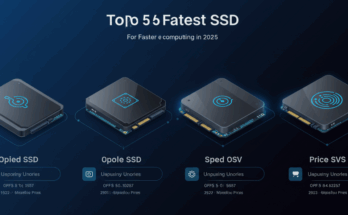The year is 2025. Quantum computing, once a futuristic concept, is rapidly evolving, leaving its mark on various sectors. From medicine and materials science to finance and artificial intelligence, its potential applications are vast and transformative. This post explores the exciting advancements shaping this groundbreaking technology.
Quantum Supremacy and Beyond
In 2025, we’re witnessing the tangible effects of quantum supremacy, where quantum computers outperform classical computers on specific tasks. Companies like IBM and Google are pushing the boundaries, unveiling increasingly powerful quantum processors. This progress is paving the way for more complex algorithms and applications exploring the potential of quantum machine learning.
Error Correction: A Crucial Step Forward
One significant hurdle in quantum computing is error correction. Quantum bits (qubits) are incredibly sensitive to noise, leading to inaccurate results. However, significant strides have been made in developing effective error correction codes, improving the reliability and scalability of quantum computers. Researchers are actively working towards fault-tolerant quantum computation, a pivotal step towards practical applications. Learn more about the challenges and advancements in quantum error correction research.
Quantum Algorithms: Solving Unsolvable Problems
New and improved quantum algorithms are continually being developed, tackling problems previously considered intractable for classical computers. These algorithms hold the key to breakthroughs in various fields. For example, Shor’s algorithm could revolutionize cryptography, while Grover’s algorithm could enhance database searching capabilities. The development of specialized quantum algorithms is an exciting area of ongoing research, leading to significant progress in materials science simulations.
Quantum Annealing: Practical Applications Today
Quantum annealing, a specialized type of quantum computing, is already finding practical applications in optimization problems. Companies are using quantum annealers to tackle complex logistical challenges, financial modeling, and drug discovery. These early applications demonstrate the real-world potential of quantum computing and its ability to provide tangible benefits to businesses in various sectors.

The Quantum Cloud: Accessibility and Collaboration
Cloud-based quantum computing platforms are making this powerful technology accessible to a wider range of researchers and developers. Companies are offering cloud access to their quantum computers, fostering collaboration and accelerating innovation. This democratization of quantum computing is vital for its growth and widespread adoption. Explore the benefits of cloud-based platforms through this insightful article.
Quantum Sensors: Revolutionizing Measurement
Quantum sensors are leveraging the unique properties of quantum mechanics to create highly sensitive measurement devices. These sensors have applications in various fields, including medical imaging, environmental monitoring, and navigation systems. Their superior precision and accuracy are pushing the boundaries of what’s possible in measurement technology. Find out more about the latest developments in quantum sensing technology.
The Future of Quantum Computing
While still in its early stages, quantum computing is rapidly advancing, showing tremendous promise. As quantum computers become more powerful and accessible, we can anticipate transformative changes across numerous sectors. The collaboration between academia and industry is crucial in navigating the challenges and unlocking the full potential of this revolutionary technology.
The future holds incredible possibilities, including the development of new materials, more effective drugs, and breakthroughs in artificial intelligence. It’s an exciting time to be witnessing this technological revolution.
Frequently Asked Questions
What are the main challenges facing quantum computing? Error correction and scalability are major hurdles. Building and maintaining stable qubits is incredibly complex.
When will quantum computers become widely available? While still in early stages, cloud access is increasing, suggesting broader availability within the next decade, though widespread adoption will likely take longer.
How will quantum computing impact my daily life? It will likely be gradual. We may see improvements in medical technologies, communication security, and other areas indirectly impacting everyday life.
What is the difference between quantum computing and classical computing? Classical computers use bits representing 0 or 1, while quantum computers use qubits, which can represent 0, 1, or a combination of both simultaneously.
What are some real-world applications of quantum computing? Drug discovery, materials science, financial modeling, and optimization problems are already benefiting from early quantum computing applications.



